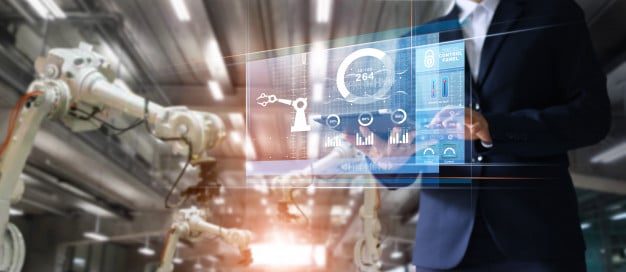How Has Robotics Changed Manufacturing Industry?
The advancement of robotics affects almost every industry; manufacturing is at the forefront. When we include robotics in manufacturing processes and factory operations, we can see an improvement in production. This is the result of good efficiency and leads to revenue increment.
Robotics has supported manufacturing sector manage many automation processes. As they become smarter, cheaper and faster, they are called to do even much more. Robots never get tired; No need a break. They took tedious and repetitive tasks and often dangerous tasks on the factory floor. Robots increased productivity and reduced labor costs.
Although robots have removed very manufacturing jobs with low skills, they have generated high-skilled jobs. Productivity improvements and cost savings caused by robots have enabled firms to invest in the creation, innovation, which has created jobs that require in product design and engineering areas.
Robotic technology in manufacturing industry continues to grow. The global expansion of industrial robots was reported by the Internal Federation of Robotics (IFR) in 2010. The number of robots in production exceeded 8.6 million in 2013. 2015 has the highest robot sales in history, up 15% from 2014.
Here, we would like to explore how has robotic technology has transformed manufacturing industry.
Get a free quote for your project!
How Robotics is Evolving the Manufacturing Industry?
#1 Handles raw material
A manufacturing factory can deal with the handling of chemical and hazardous substances. This clearly puts workers at risk, increases the risk of losing precious human lives and opens up the possibility of litigation. This is where robots set foot, filling hazardous roles for humans.
Robots can handle radioactive materials, hazardous chemicals and many other things easily without endangering humans. With the usage of robotics, you can register programs to ensure accurate management without any risks due to human error. If the worst happens, you will face mechanical repair instead of severe injury.
#2 Improves Efficiency:
Robotic technology helps amazingly in improving the efficiency of the product manufacturing process. As robotic systems are very fast, they can do a lot of things at high speeds. With the help of robots, we can do more tasks in less time.
So, manufacturing techniques are getting huge benefits from them. The use of robotics is a way to boost the economy of the entire manufacturing field.
#3 Contributes to 24/7 manufacturing operations
The introduction of robotic technology in manufacturing processes means that activities can continue throughout the day (i.e. 24*7), if necessary. As the population grows in most parts of the world, the demand for the products will increase. To provide the equipment for this huge demand, manufacturing plants and factories looks towards robotics to improve their manufacturing capacity and production time.
While manpower fatigue, lack of motivation, overwork, and subject to union laws, robots have none of these problems. When human beings do too much work, the quality of their work is definitely compromised. This puts them in critical situations and causes financial loss to the owners of the manufacturing organization.
#4 Promotes Greener environment in Workplace
There is much interest in green manufacturing across the globe. “Green” means environmentally friendly and energy efficient production.
By replacing workers with more robots by in workplace, the whole environment inside the manufacturing place can change. Since human workers no longer work, there should be no restrictions on the factory interior temperature, or whether the lights are off or on. By reducing energy with air conditioning, lighting and heat, the green workspace is promoted.
The accuracy and efficiency of robots reduce the amount of scraps created in the workplace. Less scrap is less wastage entering the environment. Influencing the environment through energy conservation and waste reduction can help an organization become more environmentally friendly and greener.
#5 Creating Jobs
Employees in the manufacturing industry may not be so excited about the opportunity for robotics to change their work process. Robots and machines have captured the jobs of many workers in the past. These include uninterrupted work at the assembly line, precise maintenance of parts and operations.
However, it is also crucial to look at the other side in terms of employment in the manufacturing industry. Robotics could capture some jobs, but these would have gone offshore without being assigned to workers in well developed nations like the United States and the UK. Homes for the manufacture of robotics, however, are actually employment created by robotics, such as manual repair, monitoring, and supervision.
Robots can be used to free up workers who can improve the skills of their own interest. That way, companies can enhance their expertise in areas where manual labor is most needed.
There is another advantage: workers in developed areas or technologies do not have to be trapped in low-wage and less skilled labor intensive jobs. The presence of robotics can help free them to shift to more manageable job positions if their management positions are touched.
#7 Improves Collaboration
Collaboration/ cooperation is very important when it comes to the manufacturing sector. The industry should regularly collaborate with retail companies, construction companies, logistics, etc.
Thankfully, advances in robotic technology can help significantly in revolutionizing the methods of collaboration used with public and other systems.
For example, robots with tracking sensors can simply detect motion and therefore cooperate with people. They can work alone from people in places, such as warehouses.
Prototyping in the manufacturing sector requires a high level of quality and accuracy. Bringing the Robotics item into the mix will allow you to achieve these goals to their maximum potential. A prototype, low volume injection molding, and rapid tooling services are somehow possible through the advancement of robotics by China 3ERP.
The use of robots has made the manufacturing and app development of many products and machines more secure, more uniform, and more reliable to boot. It also increased the repetitive capacity of production processes, which is necessary for such kind of projects.
#8 Paves way towards full automation:
The usage of robotics technology is expanding at a rapid speed. Gone are the days of taking limited tasks from these robots. Now, the approach has completely changed and paved the way for automation.
From products manufacturing to packaging those, modern robots are working on each aspect. Even small manufacturing companies are automating their works, which sounds amazing.
Final Thoughts:
Robotics will be more collaborative, convenient and smarter, as some researchers predict that soon we can easily set up robots so that they can be moved and reinstalled across various parts of the production line, with less investment than previously fixed machines.
Not only do robots communicate with humans in the near future, they also help revolutionize the skills and job roles that humans can adopt. The new generation robotics is capable of stirring up competition between manufacturing companies of all sizes.
So, if are looking to adopt robotics in your manufacturing company? Please consult us today.
We are ready to help you!
Get a free quote for your project!






















